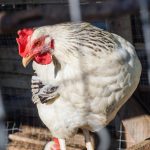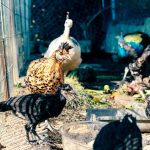Coyotes are highly adaptable and intelligent predators that pose a significant threat to chickens and other small livestock. They are found in both rural and urban areas and exhibit opportunistic hunting behavior. Primarily nocturnal, coyotes can also be active during daylight hours, especially in areas with minimal human activity.
Their ability to identify and exploit weaknesses in chicken coops and enclosures necessitates that chicken owners understand coyote behavior to effectively protect their flocks. Coyotes are skilled climbers and diggers, capable of scaling fences and burrowing under enclosures to access chickens. They demonstrate persistence in their attempts to gain access to potential food sources.
As territorial animals, coyotes mark their territory with urine and feces, which can attract other coyotes to the area. Comprehending these behaviors is essential for chicken owners to adequately secure their coops and protect their flocks from coyote attacks. The intelligence of coyotes enables them to learn and adapt to new situations, potentially rendering traditional deterrents ineffective.
Chicken owners must remain informed about coyote behavior and proactively implement protective measures to safeguard their flocks from these predators.
Table of Contents
- 1 Securing the chicken coop: building a predator-proof enclosure
- 2 Implementing deterrents: using sound, light, and motion to scare off coyotes
- 3 Removing attractants: keeping food and garbage away from the coop
- 4 Supervising free-range time: monitoring the chickens when they are outside the coop
- 5 Utilizing guardian animals: using dogs or other animals to protect the chickens
- 6 Seeking professional help: contacting wildlife experts for advice and assistance
- 7 FAQs
- 7.1 What are some effective methods for keeping coyotes from eating chickens?
- 7.2 What type of fencing is best for keeping coyotes out of a chicken coop?
- 7.3 Are there any natural deterrents that can help keep coyotes away from chickens?
- 7.4 What should I do if I encounter a coyote near my chicken coop?
- 7.5 Are there any laws or regulations regarding the control of coyotes near residential areas?
Key Takeaways
- Coyotes are intelligent and adaptable predators that are known for their opportunistic behavior, including preying on chickens.
- Building a predator-proof enclosure for chickens is essential to protect them from coyote attacks.
- Using sound, light, and motion deterrents can help scare off coyotes and prevent them from approaching the chicken coop.
- Keeping food and garbage away from the coop can help remove attractants that may draw coyotes to the area.
- Monitoring chickens when they are outside the coop can help prevent coyote attacks, especially during vulnerable times such as dusk and dawn.
- Utilizing guardian animals, such as dogs, can help protect chickens from coyote attacks by deterring them from approaching the coop.
- Contacting wildlife experts for advice and assistance can provide valuable support in dealing with coyote threats to chickens.
Securing the chicken coop: building a predator-proof enclosure
Secure Doors and Windows
In addition to the coop’s structure, it’s essential to have a secure locking mechanism on all doors and windows to prevent coyotes from forcing their way inside. This will ensure that the chickens are safe from coyote attacks even when they’re inside the coop.
Designing a Safe Chicken Run
The chicken run is where chickens are most vulnerable to coyote attacks. Therefore, it’s crucial to design the run with safety in mind. The run should be fully enclosed with a roof to prevent coyotes from jumping over or climbing into the enclosure. Adding a skirt of hardware cloth around the perimeter of the run can also help prevent coyotes from digging under the fence.
Maintenance and Prevention
Regular inspections of the coop and run are necessary to identify any signs of wear or damage. Repairs should be made promptly to ensure that the enclosure remains predator-proof. Additionally, it’s essential to minimize potential hiding spots for coyotes around the coop by keeping vegetation trimmed back and removing any debris or clutter that could provide cover for predators. By taking these measures, chicken owners can create a secure environment for their flock and reduce the risk of coyote attacks.
Implementing deterrents: using sound, light, and motion to scare off coyotes

In addition to securing the chicken coop, chicken owners can also implement deterrents to scare off coyotes and prevent them from targeting their flock. One effective deterrent is the use of sound, such as loud noises or recorded predator calls, which can startle and deter coyotes from approaching the coop. Motion-activated lights can also be effective in scaring off coyotes, as they are sensitive to sudden changes in light and may be deterred by bright, flashing lights.
Another effective deterrent is the use of motion-activated sprinkler systems, which can startle and deter coyotes with a sudden burst of water. These systems can be strategically placed around the coop and run to create a perimeter of protection against coyote attacks. Additionally, some chicken owners have found success in using predator decoys, such as fake owls or coyotes, to deter real coyotes from approaching the coop.
It is important for chicken owners to regularly rotate and vary the use of deterrents, as coyotes are intelligent animals that may become accustomed to certain stimuli over time. By using a combination of sound, light, and motion-based deterrents, chicken owners can create an environment that is less attractive to coyotes and reduce the risk of attacks on their flock.
Removing attractants: keeping food and garbage away from the coop
Coyotes are attracted to areas where they can find easy sources of food, making it important for chicken owners to remove any potential attractants from around the coop. This includes securing all chicken feed in tightly sealed containers that are stored indoors, as well as removing any spilled feed from around the coop. Additionally, it is important to keep garbage and compost bins securely closed and stored away from the coop, as these can also attract coyotes looking for an easy meal.
It is also important for chicken owners to remove any fallen fruit or vegetables from around the coop, as these can attract rodents and other small animals that may in turn attract coyotes. By keeping the area around the coop clean and free of potential food sources, chicken owners can reduce the likelihood of coyotes targeting their flock. In addition to removing attractants, it is also important for chicken owners to be mindful of their own behavior around the coop.
This includes avoiding leaving out food scraps or pet food that could attract coyotes, as well as being cautious about leaving doors or windows open that could provide access for predators. By taking these measures, chicken owners can create an environment that is less attractive to coyotes and reduce the risk of attacks on their flock.
Supervising free-range time: monitoring the chickens when they are outside the coop
Allowing chickens to free-range outside of the coop can provide numerous benefits for their health and well-being, but it also exposes them to potential predators such as coyotes. It is important for chicken owners to closely supervise their flock when they are outside the coop, especially during dawn and dusk when coyotes are most active. This can be done by physically being present outside with the chickens or by using surveillance cameras to monitor their activity.
In addition to direct supervision, chicken owners can also implement measures to protect their flock while they are free-ranging. This includes using temporary fencing or electric netting to create a secure perimeter around the area where the chickens are allowed to roam. By creating a physical barrier between the chickens and potential predators, chicken owners can reduce the risk of attacks while still allowing their flock to enjoy free-range time.
It is also important for chicken owners to be mindful of their surroundings when supervising their flock outside of the coop. This includes being aware of any signs of coyote activity in the area, such as tracks or scat, and taking appropriate measures to protect the chickens if a potential threat is identified. By closely supervising free-range time and being proactive in protecting their flock, chicken owners can reduce the risk of coyote attacks on their chickens.
Utilizing guardian animals: using dogs or other animals to protect the chickens

Effective Guardian Breeds
Many breeds of dogs have a natural instinct to protect livestock, making them well-suited for guarding a flock of chickens. When properly trained and supervised, a guardian dog can deter potential predators and provide an added layer of security for the chickens.
Alternative Guardian Animals
In addition to dogs, other animals such as llamas or donkeys can also be effective in protecting chickens from predators. These animals have a natural instinct to protect smaller livestock and can be effective in deterring predators like coyotes from approaching the coop or run.
Proper Selection and Supervision
It is important for chicken owners to carefully select and train guardian animals for their specific needs, taking into consideration factors such as the size of their flock and the local predator population. Additionally, it is important for guardian animals to be properly supervised when interacting with chickens, as they can pose a potential threat if not properly managed. By utilizing guardian animals effectively, chicken owners can provide an added layer of protection for their flock and reduce the risk of coyote attacks.
Seeking professional help: contacting wildlife experts for advice and assistance
In some cases, dealing with coyote predation on chickens may require professional assistance from wildlife experts or animal control agencies. These professionals have experience in dealing with predator issues and can provide valuable advice and assistance in protecting a flock from coyote attacks. This may include conducting a site assessment to identify potential vulnerabilities in the coop or run, as well as providing recommendations for securing the area against predators.
Wildlife experts may also be able to provide guidance on non-lethal methods for deterring coyotes from targeting chickens, such as using sound or light-based deterrents. Additionally, they may be able to provide information on local regulations regarding predator control and offer guidance on legal methods for dealing with coyote predation issues. In some cases, wildlife experts may also be able to assist with trapping and relocating problem coyotes that pose a threat to chickens.
It is important for chicken owners to seek professional help when dealing with persistent predator issues, as this can help ensure the safety of their flock while also adhering to local regulations regarding wildlife management. In conclusion, protecting chickens from coyote predation requires a multi-faceted approach that includes understanding coyote behavior, securing the coop against predators, implementing deterrents, removing attractants, supervising free-range time, utilizing guardian animals, and seeking professional help when needed. By taking these measures, chicken owners can create a safe environment for their flock and reduce the risk of attacks by coyotes or other predators.
It is important for chicken owners to stay informed about best practices for predator control and to be proactive in protecting their flock from potential threats.
If you’re looking for ways to protect your chickens from predators like coyotes, you may also be interested in learning about how to build a secure farmhouse chicken coop. This article provides valuable tips and advice on creating a safe and comfortable environment for your chickens to thrive. By implementing proper coop design and security measures, you can help keep your chickens safe from potential threats.
FAQs
What are some effective methods for keeping coyotes from eating chickens?
Some effective methods for keeping coyotes from eating chickens include using secure fencing, installing motion-activated lights or sprinklers, using guard animals such as dogs or llamas, and keeping chickens in a secure coop at night.
What type of fencing is best for keeping coyotes out of a chicken coop?
The best type of fencing for keeping coyotes out of a chicken coop is a sturdy, high-quality wire mesh fencing that is buried at least 12 inches underground and extends at least 6 feet above ground. This type of fencing helps prevent coyotes from digging under or jumping over the fence.
Are there any natural deterrents that can help keep coyotes away from chickens?
Yes, there are natural deterrents that can help keep coyotes away from chickens. Some examples include using strong-smelling substances like ammonia or predator urine around the perimeter of the coop, and planting thorny bushes or shrubs to create a barrier.
What should I do if I encounter a coyote near my chicken coop?
If you encounter a coyote near your chicken coop, it’s important to make loud noises, wave your arms, and throw objects to scare the coyote away. It’s also important to never approach or corner a coyote, and to contact local wildlife authorities if you have ongoing issues with coyotes in your area.
Are there any laws or regulations regarding the control of coyotes near residential areas?
Laws and regulations regarding the control of coyotes near residential areas vary by location. It’s important to check with local wildlife authorities or animal control agencies to understand the specific laws and regulations in your area. In some cases, it may be necessary to obtain permits or follow specific guidelines for trapping or removing coyotes.
Meet Walter, the feathered-friend fanatic of Florida! Nestled in the sunshine state, Walter struts through life with his feathered companions, clucking his way to happiness. With a coop that’s fancier than a five-star hotel, he’s the Don Juan of the chicken world. When he’s not teaching his hens to do the cha-cha, you’ll find him in a heated debate with his prized rooster, Sir Clucks-a-Lot. Walter’s poultry passion is no yolk; he’s the sunny-side-up guy you never knew you needed in your flock of friends!







